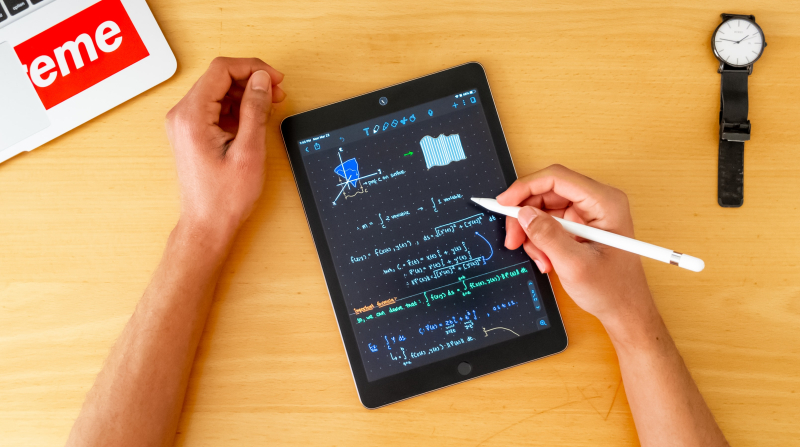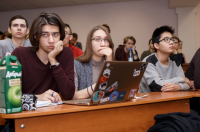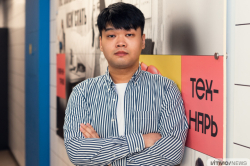Note-taking and organization
Two popular choices for note-taking named by our students were Notion and the standard Notes app by Apple.
“I use Notion because it’s free and allows you to create a section-like breakdown with specific tasks related to each section. You can also easily keep track of your progress on each task and see which task needs to get done yet,” says Johnson Oje, a first-year Bachelor’s student in Information Security.
Susan Dzhiakkhvo, a first-year PhD student at ITMO’s ChemBio Cluster, adds that Notion can come in handy for taking notes and gathering content for your future scientific publications. However, he also uses the more classic Microsoft Word and Google Docs for his reports and drafts. Nataly Tapia, a student in ITMO’s Foundation Program, praises Notion, too, for its versatility and the opportunity to customize it for any purpose.
While Apple’s Notes is a less sophisticated tool, it still allows you to quickly jot down your thoughts or organize your notes in an easy-to-navigate way. Hang Ly, a student of ITMO’s Foundation Program, tends to use color-coding to differentiate between subjects as she takes notes on her phone, while Johnson Oje also adds that this app is quite useful for taking quick notes.

Keeping track of time
Among the apps our students use for time management, Google Calendar stands out the most. Some, like Sameed Ali, use it to keep track of their class schedules, while others, like Susan Dzhiakkhvo, use it mainly for reminders.
Like many organization enthusiasts, members of ITMO.Family love using the Pomodoro method. Hang Ly says she will typically stick to the 25/5 ratio, spending 25 minutes studying and then taking a 5-minute break to unwind. Vishnu Sarraf, an aspiring ITMO student who also shared his tips in the comment section of our Telegram post, uses Flow (available only on Apple devices) to practice this technique.
“The pomodoro method helps me to manage my time efficiently, while building focus and a habit of finishing my tasks without procrastination. I would recommend starting with 25-minute working intervals and then steadily increasing them,” he says.
Overcoming the language barrier
It goes without saying that most, if not all, of our international students will have to find themselves in a new language environment and deal with at least some content and paperwork in Russian. That’s where Yandex Translate saves the day.
“This app is helpful for international students like me when we need to understand documents and notices in Russian. Though I'm in the English-taught program, it's necessary to understand Russian language in day-to-day life!” shares Huiyao Dong, a first-year PhD student in Information Security.
Peter Simwanza, a second-year Bachelor’s student in Electrical Engineering, seconds this opinion:
“Yandex Translate is a lifesaver, an all-rounder for all courses. It makes studying in Russian, and life in Russia generally, easier. It has some cool functions like real-time translating and offline translating, just to mention a few.”
Handy apps for specific tasks
Among the responses we’ve received, our students also shared more specialized apps that they use in their daily activities.
For instance, Susan Dzhiakkhvo, mentions Mendeley as the app he uses to manage references for his scientific articles. You can read more tips on organizing your references in our earlier article.
Students, who often have to deal with math and calculations, turn to apps that help them along the way.
“I use PhotoMath and Symbolab, which are basically calculators. They can help you learn certain topics in math, solve certain equations just from a picture you take of them, even when they are handwritten. With these apps, you don’t just get the answer, but can also see the process behind it,” shares Peter Simwanza.

Vo Minh Thien Long, a final-year student at the Faculty of Software Engineering and Computer Systems, speaks highly of Wolfram Alpha that he relied on especially in his first years at ITMO.
“It is a computational knowledge engine for computing answers, and is a strong tool to support us in mathematics and physics, however we could also use it to find answers from other science subjects like chemistry. As a senior student, I highly recommend everyone use it. It not only gives us the answer, but also the step-by-step solution.”
Finally, if you are looking for additional courses, Huiyao Dong recommends Stepik.
“It is the online education app I used the most, I took several courses in computer science there even before coming to Russia. The courses there are of good quality and free. I took the Data Structure course, where all topics are explained fully with a simple but useful website, and also the course AI in Medicine.”
For more stories about the experiences of international students at ITMO, follow this tag.




